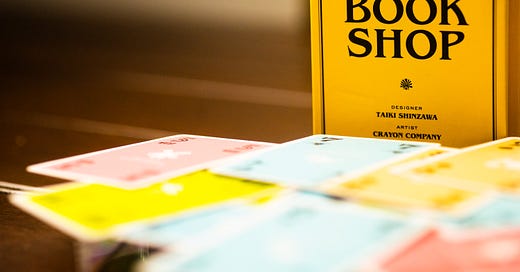American Bookshop: A new twist on an old trick
Taiki Shinzawa's American Bookshop takes a standard format and adds two fun twists.
Ah, hello there! I hope this newsletter finds you well this week. It’s been a bit chaotic over here, but that’s not always a bad thing. I’m here talking about a trick-taking game from a designer whose games I’ve really enjoyed: American Bookshop, designed by Taiki Shinzawa.
Before we get there, I’ll drop a little subscribe button link. You should see it … there. See it? Great!
I’ve made no secret of the fact that I love trick-taking games, and I know I’m not alone in that. You need look no further than AllPlay launching a Kickstarter campaign for four small-box trick-taking games on Tuesday — these delightful little card games are taking the gaming world by storm.
It’s not hard to see why: They’re compact, easy to teach, and full of strategy. While you might look at a card game as inherently random — if you’re shuffling properly, that is — it’s all about figuring out what to do with the input randomness. In
stead of being about doing things on your own, it’s all about interaction. And don’t get me wrong, I love deterministic, conflict-averse games, too. The recent surge in the popularity of trick-takers shouldn’t be seen as a reversal of some toxic trends; instead, it’s merely something old becoming new again.
The first identified trick-taking games are something like 600 years old at the very least, having originated in late imperial China. If nothing else, that should remind us that while we might see trends in gaming when we look up close, it’s when we take a step back that we see things more fully.
All that is a roundabout way of introducing the game I’m talking about today: American Bookshop. It’s a trick-taking game from Japanese designer Taiki Shinzawa, one of the preeminent trick-taking designers of our day. He’s designed games I’ve really enjoyed, like Maskmen and Ghosts of Christmas, and games I’m looking forward to enjoying in the future, like Planet etuC and ルイス (luz), among several others.
American Bookshop takes the standard trick-taking formula — play a card to the trick, and the highest card of the led suit takes the trick. However, if the sum of the cards in the trick ever exceeds a value determined by the number of players in the game, then the player who added the card takes the trick. You might think that’s fantastic — and it might be. But taking cards isn’t strictly favorable, because each card you take is worth a negative point. If you manage to have the most cards in that suit at the end of the game, you can reverse the polarity of the cards (which in non-technobabble terms just means your cards in suits you win are worth a point instead of a negative point.)
That’s the game in a nutshell. You could easily proxy the game with a standard deck of cards if you wanted to give it a whirl, but you can also find it without too much trouble both stateside, although it’ll set you back something around $40 — you get to decide if it’s worth it for you. I wouldn’t be shocked to see a U.S. publisher taking this gem on, though. Maybe it’s a real bide-your-time circumstance, or maybe it’s worth taking a look at a more accessible game designed by Taiki Shinzawa, like Maskmen.
What makes American Bookshop worth playing, and what makes it worth playing ahead of other trick-taking games? I particularly like the combination of the positive and negative scoring factors. On one hand, I like trying to suss out if I can take the most cards in a particular suit, thus giving me points for each card. On the other, I like that getting the first part wrong can lead to some decidedly negative consequences. That can create situations that swing the score from round to round, leaving things competitive often until the last round.
American Bookshop is one of my favorite games I’ve played recently. It has a strong sense of identity: It’s a trick-taking game with a couple small twists that give it an exciting, fresh feel. Taking something old and refreshing it is exactly what I needed in a game.
Thanks, as always, for reading until the end. I’ll see the lot of you next week — I don’t know exactly the subject I’ll explore, but I’ve got a topic in mind that I’m excited to get to you. I just need to do the slightest bit more research first. Time will tell if it comes before or after the baby, though. We’ll see!





